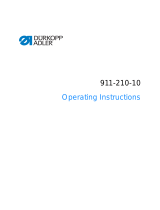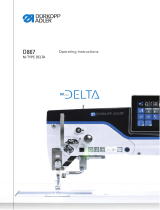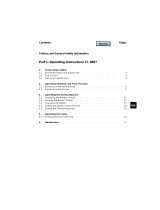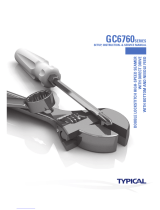
670/680
Operating Instructions

All rights reserved.
Property of Dürkopp Adler AG and protected by copyright.
Any reuse of these contents, including extracts, is prohibited without the
prior written approval of Dürkopp Adler AG.
Copyright © Dürkopp Adler AG 2018
IMPORTANT
READ CAREFULLY BEFORE USE
KEEP FOR FUTURE REFERENCE

Table of Contents
Operating Instructions 670/680 - 02.0 - 01/2018 1
1 About these instructions....................................................................3
1.1 For whom are these instructions intended? ..........................................3
1.2 Representation conventions – symbols and characters........................4
1.3 Other documents...................................................................................5
1.4 Liability ..................................................................................................6
2 Safety....................................................................................................7
2.1 Basic safety instructions........................................................................7
2.2 Signal words and symbols used in warnings.........................................8
3 Machine description..........................................................................13
3.1 Components of the machine ...............................................................13
3.2 Proper use...........................................................................................15
3.3 Declaration of Conformity....................................................................16
4 Operation ...........................................................................................17
4.1 Preparing the machine for operation...................................................17
4.2 Switching on and off the machine .......................................................17
4.3 Changing the needle ...........................................................................18
4.4 Threading the needle thread...............................................................20
4.5 Winding the hook thread .....................................................................22
4.6 Changing the bobbin ...........................................................................24
4.7 Thread tension ....................................................................................26
4.7.1 Setting the needle thread tension........................................................27
4.7.2 Setting the hook thread tension...........................................................29
4.8 Setting the needle thread regulator.....................................................30
4.9 Setting the fullness..............................................................................31
4.10 Lifting the sewing feet..........................................................................32
4.11 Locking the sewing feet at top dead center.........................................33
4.12 Setting the sewing foot pressure.........................................................34
4.13 Setting the sewing foot stroke.............................................................35
4.14 Setting the stitch length.......................................................................36
4.15 Buttons on the machine arm ...............................................................37
4.15.1 Assigning functions to the favorite button............................................39
4.16 Setting the height stop for the stitch loosening device........................40
4.17 Sewing.................................................................................................41
5 Programming.....................................................................................43
6 Maintenance.......................................................................................49
6.1 Cleaning ..............................................................................................50
6.2 Lubricating...........................................................................................52
6.3 Servicing the pneumatic system..........................................................54
6.3.1 Setting the operating pressure............................................................54

Table of Contents
Operating Instructions 670/680 - 02.0 - 01/20182
6.3.2 Draining the water condensation.........................................................55
6.3.3 Cleaning the filter element...................................................................57
6.4 Parts list...............................................................................................58
7 Setup ..................................................................................................59
7.1 Checking the scope of delivery ...........................................................59
7.2 Removing the transport locks..............................................................59
7.3 Assembling the stand..........................................................................60
7.4 Assembling the pedal..........................................................................61
7.5 Setting the working height...................................................................62
7.6 Machine head......................................................................................64
7.6.1 Inserting the machine head.................................................................64
7.6.2 Assembling the oil extraction line........................................................65
7.6.3 Setting the knee button .......................................................................66
7.7 Electrical connection ...........................................................................68
7.8 Pneumatic connection.........................................................................69
7.8.1 Assembling the compressed air maintenance unit..............................70
7.8.2 Setting the operating pressure............................................................71
7.9 Performing a test run...........................................................................72
8 Decommissioning .............................................................................73
9 Disposal .............................................................................................75
10 Troubleshooting................................................................................77
10.1 Customer Service................................................................................77
10.2 Messages of the software ...................................................................78
10.3 Errors in sewing process.....................................................................86
11 Technical data ...................................................................................89
12 Appendix............................................................................................91
12.1 Wiring diagram ....................................................................................91
12.2 Dimensions for manufacturing a table top...........................................95

About these instructions
Operating Instructions 670/680 - 02.0 - 01/2018 3
1 About these instructions
These instructions have been prepared with utmost care.
They contain information and notes intended to ensure long-term
and reliable operation.
Should you notice any discrepancies or if you have improvement
requests, then we would be glad to receive your feedback through
Customer Service ( p. 77).
Consider the instructions part of the product and store them in a
place where they are readily available.
1.1 For whom are these instructions intended?
These instructions are intended for:
• Operators:
This group is familiar with the machine and has access
to the instructions. Specifically, chapter Operation
( p. 17) is important for the operators.
• Specialists:
This group has the appropriate technical training for
performing maintenance or repairing malfunctions.
Specifically, the chapter Setup ( p. 59) is important
for specialists.
Service Instructions are supplied separately.
With regard to minimum qualification and other requirements to be
met by personnel, please also follow the chapter Safety ( p. 7).

About these instructions
4 Operating Instructions 670/680 - 02.0 - 01/2018
1.2 Representation conventions – symbols and
characters
Various information in these instructions is represented or high-
lighted by the following characters in order to facilitate easy and
quick understanding:
Proper setting
Specifies proper setting.
Disturbances
Specifies the disturbances that can occur from an incorrect setting.
Cover
Specifies which covers must be disassembled in order to access
the components to be set.
Steps to be performed when operating the machine (sewing
and equipping)
Steps to be performed for service, maintenance, and
installation
Steps to be performed via the software control panel
The individual steps are numbered:
First step
Second step
The steps must always be followed in the specified order.
Lists are marked by bullet points.
Result of performing an operation
Change to the machine or on the display/control panel.
Important
Special attention must be paid to this point when performing a step.
1.
2.
...
•

About these instructions
Operating Instructions 670/680 - 02.0 - 01/2018 5
Information
Additional information, e.g. on alternative operating options.
Order
Specifies the work to be performed before or after a setting.
References
Reference to another section in these instructions.
Safety Important warnings for the user of the machine are specifically
marked. Since safety is of particular importance, hazard symbols,
levels of danger and their signal words are described separately
in the chapter Safety ( p. 7).
Location
information
If no other clear location information is used in a figure, indications
of right or left are always from the user's point of view.
1.3 Other documents
The machine includes components from other manufacturers.
Each manufacturer has performed a hazard assessment for these
purchased parts and confirmed their design compliance with
applicable European and national regulations. The proper use of
the built-in components is described in the corresponding manu-
facturer's instructions.

About these instructions
6 Operating Instructions 670/680 - 02.0 - 01/2018
1.4 Liability
All information and notes in these instructions have been compiled
in accordance with the latest technology and the applicable stan-
dards and regulations.
Dürkopp Adler cannot be held liable for any damage resulting
from:
• Breakage and damage during transport
• Failure to observe these instructions
• Improper use
• Unauthorized modifications to the machine
• Use of untrained personnel
• Use of unapproved parts
Transport
Dürkopp Adler cannot be held liable for breakage and transport
damages. Inspect the delivery immediately upon receiving it.
Report any damage to the last transport manager. This also
applies if the packaging is not damaged.
Leave machines, equipment and packaging material in the con-
dition in which they were found when the damage was discovered.
This will ensure any claims against the transport company.
Report all other complaints to Dürkopp Adler immediately after
receiving the product.

Safety
Operating Instructions 670/680 - 02.0 - 01/2018 7
2 Safety
This chapter contains basic information for your safety. Read the
instructions carefully before setting up or operating the machine.
Make sure to follow the information included in the safety instruc-
tions. Failure to do so can result in serious injury and property
damage.
2.1 Basic safety instructions
The machine may only be used as described in these instructions.
The instructions should be available at the machine's location at
all times.
Work on live components and equipment is prohibited.
Exceptions are defined in the DIN VDE 0105.
For the following work, switch off the machine at the main switch
or disconnect the power plug:
• Replacing the needle or other sewing tools
• Leaving the workstation
• Performing maintenance work and repairs
• Threading
Missing or faulty parts could impair safety and damage the
machine. Only use original parts from the manufacturer.
Transport Use a lifting carriage or forklift to transport the machine. Raise the
machine max. 20 mm and secure it to prevent it from slipping off.
Setup The connecting cable must have a power plug approved in the
relevant country. The power plug may only be assembled to the
power cable by qualified specialists.
Obligations
of the operator
Follow the country-specific safety and accident prevention regu-
lations and the legal regulations concerning industrial safety and
the protection of the environment.

Safety
8 Operating Instructions 670/680 - 02.0 - 01/2018
All the warnings and safety signs on the machine must always be
in legible condition. Do not remove!
Missing or damaged warnings and safety signs must be replaced
immediately.
Requirements
to be met by
the personnel
Only qualified specialists may:
• set up the machine
• perform maintenance work and repairs
• perform work on electrical equipment
Only authorized persons may work on the machine and must first
have understood these instructions.
Operation Check the machine during operating for any externally visible
damage. Stop working if you notice any changes to the machine.
Report any changes to your supervisor. Do not use a damaged
machine any further.
Safety
equipment
Safety equipment should not be removed or deactivated. If it is
essential to remove or deactivate safety equipment for a repair
operation, it must be assembled and put back into operation
immediately afterward.
2.2 Signal words and symbols used in
warnings
Warnings in the text are distinguished by color bars. The color
scheme is based on the severity of the danger. Signal words
indicate the severity of the danger.
Signal words Signal words and the hazard they describe:
Signal word Meaning
DANGER (with hazard symbol)
If ignored, fatal or serious injury will result
WARNING (with hazard symbol)
If ignored, fatal or serious injury can result

Safety
Operating Instructions 670/680 - 02.0 - 01/2018 9
Symbols The following symbols indicate the type of danger to personnel:
CAUTION (with hazard symbol)
If ignored, moderate or minor injury can result
CAUTION (with hazard symbol)
If ignored, environmental damage can result
NOTICE (without hazard symbol)
If ignored, property damage can result
Symbol Type of danger
General
Electric shock
Puncture
Crushing
Environmental damage

Safety
10 Operating Instructions 670/680 - 02.0 - 01/2018
Examples Examples of the layout of warnings in the text:
This is what a warning looks like for a hazard that will result
in serious injury or even death if ignored.
This is what a warning looks like for a hazard that could
result in serious or even fatal injury if ignored.
This is what a warning looks like for a hazard that could
result in moderate or minor injury if the warning is ignored.
DANGER
Type and source of danger!
Consequences of non-compliance.
Measures for avoiding the danger.
WARNING
Type and source of danger!
Consequences of non-compliance.
Measures for avoiding the danger.
CAUTION
Type and source of danger!
Consequences of non-compliance.
Measures for avoiding the danger.

Safety
Operating Instructions 670/680 - 02.0 - 01/2018 11
This is what a warning looks like for a hazard that could
result in property damage if ignored.
This is what a warning looks like for a hazard that could
result in environmental damage if ignored.
NOTICE
Type and source of danger!
Consequences of non-compliance.
Measures for avoiding the danger.
CAUTION
Type and source of danger!
Consequences of non-compliance.
Measures for avoiding the danger.

Safety
12 Operating Instructions 670/680 - 02.0 - 01/2018

Machine description
Operating Instructions 670/680 - 02.0 - 01/2018 13
3 Machine description
3.1 Components of the machine
Components of the 670
Fig. 1: Components of the 670
(1) - Control panel OP1000
(2) - Adjusting wheels for sewing
foot stroke
(3) - Adjusting screw for sewing
foot pressure
(4) - Buttons on the machine arm
(5) - Sewing table
(6) - Adjusting wheels for stitch length
(7) - Oil reservoir inspection glass
(8) - Winder
(9) - Handwheel
①
②
③
⑤
⑥
⑦
⑧
⑨
④

Machine description
14 Operating Instructions 670/680 - 02.0 - 01/2018
Components of the 680
Fig. 2: Components of the 680
(1) - Control panel OP1000
(2) - Adjusting wheels for sewing
foot stroke
(3) - Adjusting screw for sewing
foot pressure
(4) - Buttons on the machine arm
(5) - Sewing table
(6) - Adjusting wheels for stitch length
(7) - Oil reservoir inspection glass
(8) - Winder
(9) - Handwheel
①
②
③
⑤
⑥
⑦
⑧
⑨
④

Machine description
Operating Instructions 670/680 - 02.0 - 01/2018 15
Control panel OP1000
Fig. 3: Control panel OP1000
Information
Refer to the Instructions for use DAC basic/classic for the
functions of the control.
3.2 Proper use
The machine may only be used with sewing material that satisfies
the requirements of the specific application at hand.
The machine is intended only for use with dry sewing material.
The sewing material must not contain any hard objects.
The needle thicknesses permissible for the machine are listed in
the Technical data ( p. 89) chapter.
The seam must be completed with a thread that satisfies the
requirements of the specific application at hand.
The machine is intended for industrial use.
(10)- Power LED
(11)- Thread button group
(12)- Function button
(13)- Programming button group
(14)- Seam program button group
(15)- LED for 2
nd
stitch length
(16)- Display
⑫
⑬⑭ ⑮
⑫
⑯
⑰⑪

Machine description
16 Operating Instructions 670/680 - 02.0 - 01/2018
The machine may only be set up and operated in dry conditions on
well-maintained premises. If the machine is operated on premises
that are not dry and well-maintained, then further measures may
be required which must be compatible with DIN EN 60204-31.
Only authorized persons may work on the machine.
Dürkopp Adler cannot be held liable for damages resulting from
improper use.
3.3 Declaration of Conformity
The machine complies with European regulations ensuring health,
safety, and environmental protection as specified in the declara-
tion of conformity or in the declaration of incorporation.
WARNING
Risk from live, moving and cutting parts as well
as from sharp parts!
Improper use can result in electric shock,
crushing, cutting and punctures.
Follow all instructions provided.
NOTICE
Non-observance will lead to property damage!
Improper use can result in material damage at the machine.
Follow all instructions provided.

Operation
Operating Instructions 670/680 - 02.0 - 01/2018 17
4 Operation
The operating sequence consists of several different steps.
Fault-free operation is necessary in order to achieve a good
sewing result.
4.1 Preparing the machine for operation
Complete the following steps in preparation of sewing before
starting to work:
• Inserting/changing the needle
• Threading the needle thread
• Inserting and winding on the hook thread
• Setting the thread tension
4.2 Switching on and off the machine
Fig. 4: Switching on and off the machine
WARNING
Risk of injury from moving, cutting and sharp
parts!
Crushing, cutting and punctures are possible.
If possible, make preparations only when the
machine is switched off.
(1) - Indicator lamps (2) - Main switch
①
②

Operation
18 Operating Instructions 670/680 - 02.0 - 01/2018
To switch on the machine:
1. Move the main switch (2) from position O to position I.
The indicator lamps (1) light up.
To switch off the machine:
1. Move the main switch (2) from position I to position O.
The indicator lamps (1) go out.
4.3 Changing the needle
CAUTION
Risk of injury from sharp and moving parts!
Puncture or crushing possible.
Only insert or change the needle with the
machine switched off.
NOTICE
Property damage may occur!
The insertion of a thinner needle can lead to skipped stitches
or damage to the thread!
The insertion of a thicker needle can result in damage to the
hook tip or the needle!
When switching to a different needle, adjust the clearance
between the hook and the needle ( Service Instructions).
Page is loading ...
Page is loading ...
Page is loading ...
Page is loading ...
Page is loading ...
Page is loading ...
Page is loading ...
Page is loading ...
Page is loading ...
Page is loading ...
Page is loading ...
Page is loading ...
Page is loading ...
Page is loading ...
Page is loading ...
Page is loading ...
Page is loading ...
Page is loading ...
Page is loading ...
Page is loading ...
Page is loading ...
Page is loading ...
Page is loading ...
Page is loading ...
Page is loading ...
Page is loading ...
Page is loading ...
Page is loading ...
Page is loading ...
Page is loading ...
Page is loading ...
Page is loading ...
Page is loading ...
Page is loading ...
Page is loading ...
Page is loading ...
Page is loading ...
Page is loading ...
Page is loading ...
Page is loading ...
Page is loading ...
Page is loading ...
Page is loading ...
Page is loading ...
Page is loading ...
Page is loading ...
Page is loading ...
Page is loading ...
Page is loading ...
Page is loading ...
Page is loading ...
Page is loading ...
Page is loading ...
Page is loading ...
Page is loading ...
Page is loading ...
Page is loading ...
Page is loading ...
Page is loading ...
Page is loading ...
Page is loading ...
Page is loading ...
Page is loading ...
Page is loading ...
Page is loading ...
Page is loading ...
Page is loading ...
Page is loading ...
Page is loading ...
Page is loading ...
Page is loading ...
Page is loading ...
Page is loading ...
Page is loading ...
Page is loading ...
Page is loading ...
Page is loading ...
Page is loading ...
Page is loading ...
Page is loading ...
Page is loading ...
Page is loading ...
Page is loading ...
Page is loading ...
/












